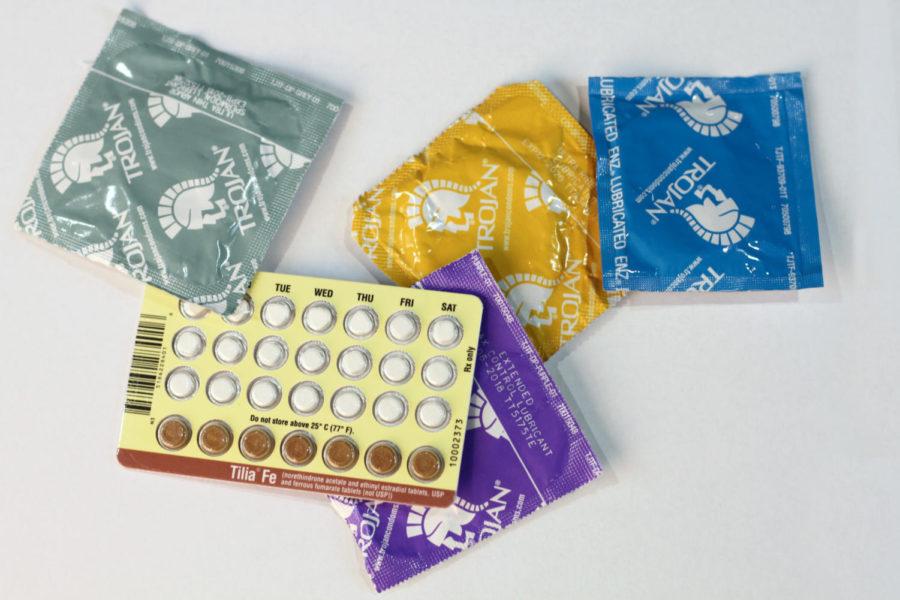Student Health approaches sexual health with PrEP, HPV vaccination, long term contraceptives
Hannah Olson / Iowa State Daily
condom stock photo
August 21, 2017
Thielen Student Health Center is bringing attention to sexual health by emphasizing long-term birth control, PrEP medication for those who are HIV negative wanting to sexually interact with those who are HIV positive and encouraging students to get HPV vaccinations that could prevent cancers in men and women.
Health Center Director Erin Baldwin accredits her team for the expansion of services they have been able to supply the ISU community.
“We had a great year last year, we had the most visits we had in history,” Baldwin said. “We are happy with how things are going and we have a good team on board. We are excited for this school year.”
Women’s Health
Mary Raman, nurse practitioner in women’s health, mentioned their emphasis on long-term birth control options, Intrauterine Device (IUD) and Nexplanon. These are birth control options that are inserted by a medical professional.
“One of our goals is to increase awareness and implementation of those types of contraceptives,” said Raman. “They’re the most effective form of contraceptives available at this time and they are very safe for almost all women.”
IUDs, according to the website Birth Control, “is a small t-shaped device that is made out of flexible plastic.” It can keep a women protected from pregnancy from between three to 12 years with over 99 percent effectiveness.
IUDs are inserted into the uterus and creates thick cervical mucus that keeps the sperm from attaching to the egg. Since the sperm does not reach the egg, the egg is not fertilized and pregnancy does not take place. There are two types of IUDs, copper and hormonal. The copper IUD does not provide hormones while the hormonal IUD does and can stop ovulation.
Nexplanon is a small bar that is “the size of a cardboard match stick,” according to Birth Control. The bar is inserted into the arm and releases hormones that also makes the cervical mucus thick and prevents the sperm from fertilizing the egg.
Student Health can get women started on either of these birth control options by having a consultation to find the right option for the patient and then a second appointment to insert the birth control.
“We have more providers who can place those types of contraceptives,” Raman said.
While some providers are family practice and can help with any women’s health care, four providers are specifically trained in inserting IUDs and five are able to insert Nexplanon.
PrEP
Pre-Exposure Prophylaxis, or PrEP, is part of a series of anti-HIV medication that allows people who are HIV negative to be sexually active with people who are HIV positive without becoming infected.
“Dr. Dan Fulton [infectious diseases specialist from Mary Greeley Medical Center], came over and we had a good primer about PrEP,” Raman said. “I think that’s something that is something as providers we are learning more and more about.”
Student Health is able to help provide PrEP to those who are interested.
“We want to help identify those students who would benefit from it and typically we are going to refer them to infectious disease,” Raman said. “We can initiate it here and Dr. Fulton can help consult with that, but ideally, for compliance purposes the start of it would happen with Dr. Fulton.”
According to the Center of Disease Control, current studies show that the maximum protection can be reached after approximately three weeks of taking PrEP.
“The majority of [Dr. Fulton’s] patients that are on PrEP are Iowa State students,” Raman said. “So we have a really critical role.”
HPV Vaccination
The Center of Disease Control (CDC) is suggesting that people between 15 and 26 years old get a three dose vaccination for Human Papillomavirus (HPV), which are available at Student Health.
HPV can be contracted by having oral, vaginal or anal sex. “HPV infection causes cervical, vaginal and vulvar cancers in women, penile cancers in men and oropharyngeal and anal cancers in men and women.”
“[The vaccination] has been on the market for 10 [or] 11 years now and it is typically covered [by insurance companies],” Raman said.
CDC is suggesting 11 to 12-year-old girls to start getting the HPV vaccination because it is before most females become sexually active and can be exposed. For those who receive the vaccination between ages 9 and 14, there are only two doses necessary.
















